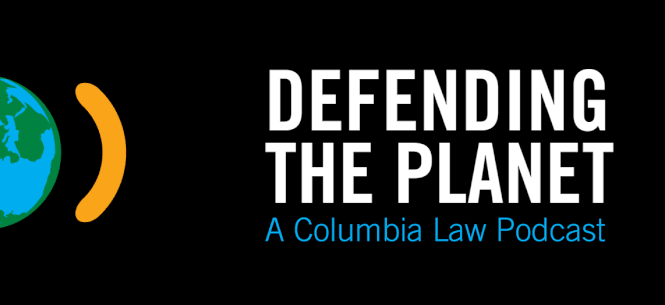
Defending the Planet Ep3: Back in the Paris Pact
Loading...
Files
Download Transcript - Defending the Planet Ep3: Back in the Paris Pact (123 KB)
Document Type
Podcast
Publication Year
2021
Description
With a new presidential administration in power, the United States has rejoined the 195-nation Paris climate agreement to combat global warming. But it is now clear that the emissions-reduction targets laid out in that 2015 accord are insufficient to prevent a catastrophic rise in global temperatures. And during the U.S. absence, the dynamic of international cooperation among major nations has shifted. What role can international cooperation play in the climate change fight, and what are its limits?
U.S. diplomat Sue Biniaz ’83 and European Climate Foundation CEO Laurence Tubiana, key architects of the Paris pact, join host Michael Gerrard to discuss multilateral cooperation on climate change.
Disciplines
Energy and Utilities Law | Energy Policy | Environmental Law | Environmental Policy | Law | State and Local Government Law
Recommended Citation
Gerrard, Michael B.; Tubiana, Laurence; and Biniaz, Susan, "Defending the Planet Ep3: Back in the Paris Pact" (2021). Defending the Planet. 4.
https://scholarship.law.columbia.edu/defending_the_planet/4



Episode Details
Released: June 16, 2021
Length: 37:00
Featuring:
Laurence Tubiana is CEO of the European Climate Foundation (ECF). In addition to her role at ECF, she is the chair of the board of governors at the French Development Agency and a professor at Sciences Po, Paris. Before joining ECF, Tubiana was France’s climate change ambassador and special representative for the 21st Conference of the Parties (COP21) to the United Nations Framework on Climate Change and was a key architect of the landmark Paris Agreement. Following COP21 and through COP22, she was appointed high-level champion for climate action.
From 1997 to 2002, Tubiana served as senior adviser on the environment to French Prime Minister Lionel Jospin. In 2002, she founded the Institute of Sustainable Development and International Relations, which she directed until 2014. From 2009 to 2010, she created and led the Directorate for Global Public Goods at the French Ministry of Foreign Affairs. Tubiana’s academic positions include serving as professor of international affairs at Columbia University. She has also been a member of numerous boards and scientific committees, including the Chinese Committee on the Environment and International Development.
From 1989 to 2017, Sue Biniaz ’83 was the lead climate lawyer in the U.S. Department of State, including for the negotiation of the United Nations Framework Convention on Climate Change, the Kyoto Protocol, the Copenhagen Accord and Cancun Agreements, and the Paris Agreement. During her tenure at the State Department, Biniaz was a deputy legal adviser, where she supervised the Treaty Office and issues related to the law of the sea, Somali piracy, the Western Hemisphere, human rights, law enforcement, and private international law. Prior to that, she led the State Department’s legal office for the Bureau of Oceans and International Environmental and Scientific Affairs, as well as the legal office for European Affairs.
Outside of government, Biniaz was a senior fellow at the United Nations Foundation and taught various international law courses at Columbia, Yale, and the University of Chicago. She recently returned to the State Department to support Special Presidential Envoy on Climate John Kerry on international climate negotiations. Biniaz is also a senior fellow and lecturer at the Yale Jackson Institute for Global Affairs and was until recently a member of the Law School’s adjunct faculty and a senior fellow with the Sabin Center for Climate Change Law.
Hosted By:
Michael B. Gerrard, Andrew Sabin Professor of Professional Practice, is the founder and faculty director of the Sabin Center for Climate Change Law. He writes and teaches courses on environmental law, climate change law, and energy regulation. He was the chair of the faculty of Columbia University’s Earth Institute from 2015 to 2018. Before joining the Columbia Law School faculty in 2009, Gerrard practiced environmental law full-time for 30 years, most recently as the partner in charge of the New York office of Arnold & Porter, where he remains senior counsel. He tried cases and argued appeals in federal and state courts and administrative tribunals. Gerrard has written or edited more than a dozen books, including Legal Pathways to Deep Decarbonization in the United States (co-edited with John Dernbach). He is the former chair of the American Bar Association’s Section of Environment, Energy, and Resources. He also has chaired the New York State Bar Association’s environmental law section.